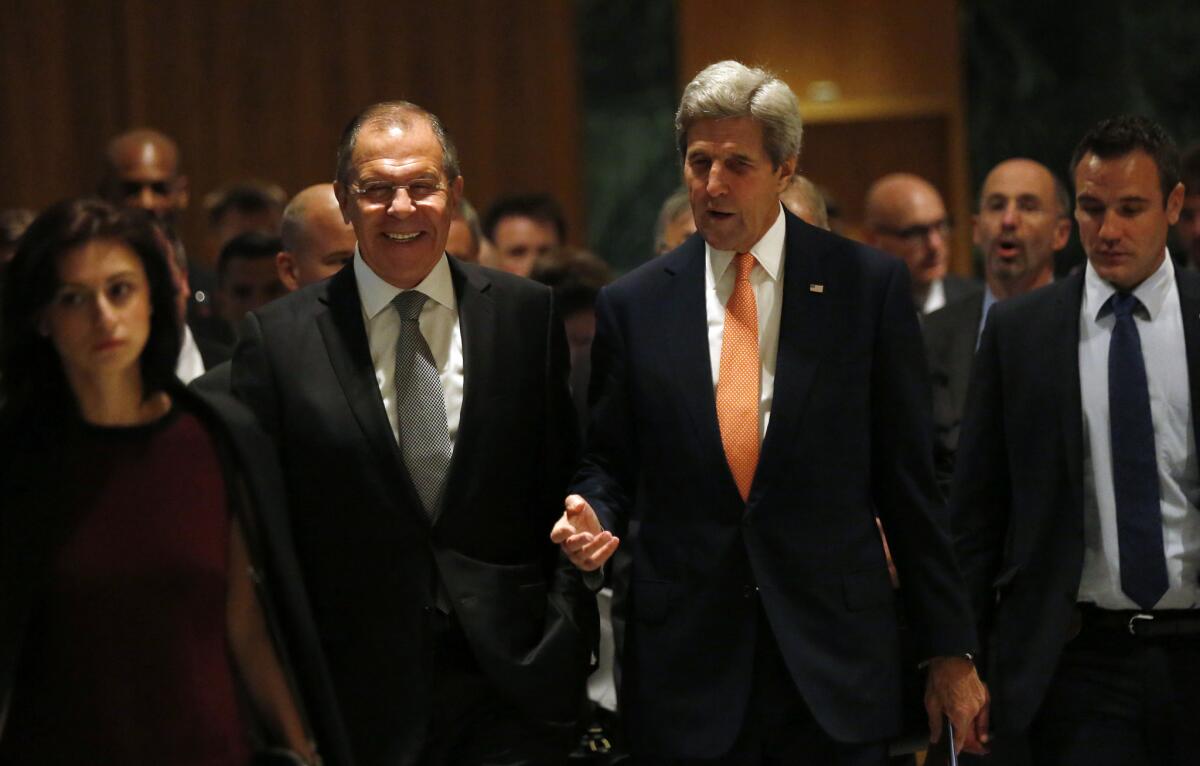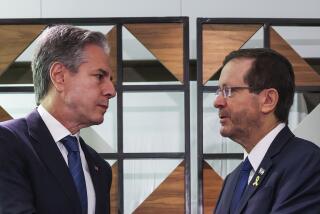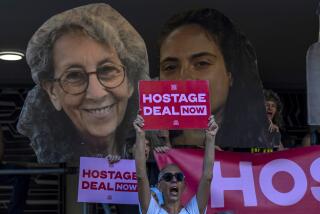U.S., Russia reach deal to reduce violence in Syria, Kerry says

U.S. Secretary of State John F. Kerry, left, and Russian Foreign Minister Sergey Lavrov met Sept. 9 in Geneva.
After days of hard-fought talks, the Obama administration and Russia announced a new plan aimed at imposing a cease-fire in Syria that would end the current bloodshed and create an opening for political talks but require difficult steps from all parties.
Secretary of State John F. Kerry, emerging from negotiations in Geneva and sideline talks with officials in Washington, called the new agreement a potential “turning point” in the five-year-long civil war that has claimed hundreds of thousands of lives and dragged the United States into untenable diplomatic and military complications.
Under the agreement, a national cease-fire would begin in Syria at nightfall Monday, timing that coincides with the significant Muslim holiday of Eid al-Adha. The United States had insisted that the cease-fire hold in place for a time — and that Russia use its influence to ground the air force of Syrian President Bashar Assad — before moving to the next step: a new partnership with Russia.
Under that next step, the U.S. would share more intelligence with the Russian military in what’s supposed to become a joint effort to attack terrorist groups, including Islamic State and the Syrian branch of Al Qaeda. Russia in the past has used the cover of bombing groups it called “terrorists” when it was attacking anti-Assad rebel groups supported by the U.S.
Until a cease-fire holds, U.S. officials believe, it will be next to impossible to advance the political negotiations aimed at a transition in Syria that would include an interim government and elections and usher President Bashar Assad from power.
The Obama administration had originally insisted that Assad be removed from office quickly, with Obama saying that Assad had proven himself undeserving to lead a people he had brutalized. But faced with the reality that Russian support has stabilized Assad’s hold on much of the country, the U.S. has relented to an extent, insisting only that he eventually be replaced.
Russian Foreign Minister Sergey Lavrov, who joined Kerry in the talks, confirmed the agreement during a news conference held by the two men. He had said hours earlier that Russia was on board and merely waiting for the U.S. to sign on, as Kerry conducted discussions with other administration officials. Pentagon officials have expressed skepticism about the negotiations, saying that Russia has proven untrustworthy in its actions in Syria so far.
Lavrov said Assad’s government was prepared to comply.
While the Russians must try to keep Assad in compliance, Washington will be required to use its influence to persuade the rebel groups it supports to respect the cease-fire and to distance themselves from more extremist groups like the Nusra Front, the Al Qaeda surrogate in Syria.
The talks gained a new sense of urgency in recent days as Aleppo, Syria’s second-largest city — and once its most beautiful — moves to the brink of a total siege by government forces. Assad’s military has routinely shelled civilian areas of the city, including hospitals. On Friday, government forces claimed to have retaken a key transit point leading into the government-controlled western side of Aleppo. Rebels control the east.
Under the cease-fire, if it takes hold, routes for desperately needed humanitarian aid would be opened into several enclaves where residents are reported to be on the edge of starvation.
Welcoming the announcement, United Nations special envoy Staffan de Mistura said he hoped this latest cease-fire effort would prove more successful than previous ones.
“The United Nations stands ready to deliver and to do whatever it can to support an early restoration of the cessation of hostilities,” De Mistura told reporters. “It also expects that all parties will facilitate U.N. efforts to indeed deliver humanitarian assistance to the population in need.”
ALSO
U.S. slams Netanyahu after he equates opposition to Israeli settlements with ‘ethnic cleansing’
Obama calls North Korea’s latest nuclear test a ‘grave threat’ to international stability
Why a new opposition road map isn’t the breakthrough negotiators are seeking in Syria
UPDATES:
4:55 p.m.: This article was updated with staff reporting, additional details and reaction.
3:50 p.m.: This article was updated with additional details.
This article was originally published at 3:30 p.m.
More to Read
Sign up for Essential California
The most important California stories and recommendations in your inbox every morning.
You may occasionally receive promotional content from the Los Angeles Times.











